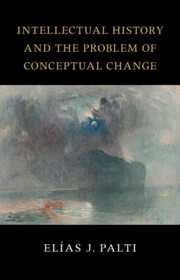Book contents
- Intellectual History and the Problem of Conceptual Change
- The Seeley Lectures
- Intellectual History and the Problem of Conceptual Change
- Copyright page
- Contents
- Preface
- Acknowledgments
- Introduction
- Chapter 1 Pocock, Skinner, and the “Historiographical Revolution”
- Chapter 2 The Republican Genealogy and the Normative Temptation
- Chapter 3 The Problem of Conceptual Change
- Chapter 4 Conceptual History
- Chapter 5 Koselleck’s Begriffsgeschichte
- Chapter 6 Hans Blumenberg and the Theory of Nonconceptuality
- Chapter 7 From Structuralism to Poststructuralism
- Chapter 8 Foucault’s Archaeology of Knowledge
- Chapter 9 The Archaeological Project and the Ignored Epistemic Mutation
- Chapter 10 Behind the Structures and the Subject
- Conclusion
- Epilogue
- Quoted Bibliography
- Index
Chapter 8 - Foucault’s Archaeology of Knowledge
Published online by Cambridge University Press: 02 May 2024
- Intellectual History and the Problem of Conceptual Change
- The Seeley Lectures
- Intellectual History and the Problem of Conceptual Change
- Copyright page
- Contents
- Preface
- Acknowledgments
- Introduction
- Chapter 1 Pocock, Skinner, and the “Historiographical Revolution”
- Chapter 2 The Republican Genealogy and the Normative Temptation
- Chapter 3 The Problem of Conceptual Change
- Chapter 4 Conceptual History
- Chapter 5 Koselleck’s Begriffsgeschichte
- Chapter 6 Hans Blumenberg and the Theory of Nonconceptuality
- Chapter 7 From Structuralism to Poststructuralism
- Chapter 8 Foucault’s Archaeology of Knowledge
- Chapter 9 The Archaeological Project and the Ignored Epistemic Mutation
- Chapter 10 Behind the Structures and the Subject
- Conclusion
- Epilogue
- Quoted Bibliography
- Index
Summary
Chapter 8 is dedicated to analyze the conceptual foundations of Foucault’s archaeology of knowledge. This provides an insight into the preconceptual constitution of the “ground of depositivities” on which theories hold. Then, it discusses the criticism to it and Foucault’s answer to his critics. This led him to elaborate on the difference between “structures” and “discursive formations” and develop the different strategies needed for the reconstruction of the latter. As this chapter shows, Foucault’s perspective combines the two opposite currents, structuralism and phenomenology, to elaborate a particularly fruitful approach to intellectual history. Finally, it addresses the crucial point of how to account for epistemic mutations and what he calls its événementiel character.
Keywords
- Type
- Chapter
- Information
- Intellectual History and the Problem of Conceptual Change , pp. 167 - 194Publisher: Cambridge University PressPrint publication year: 2024

